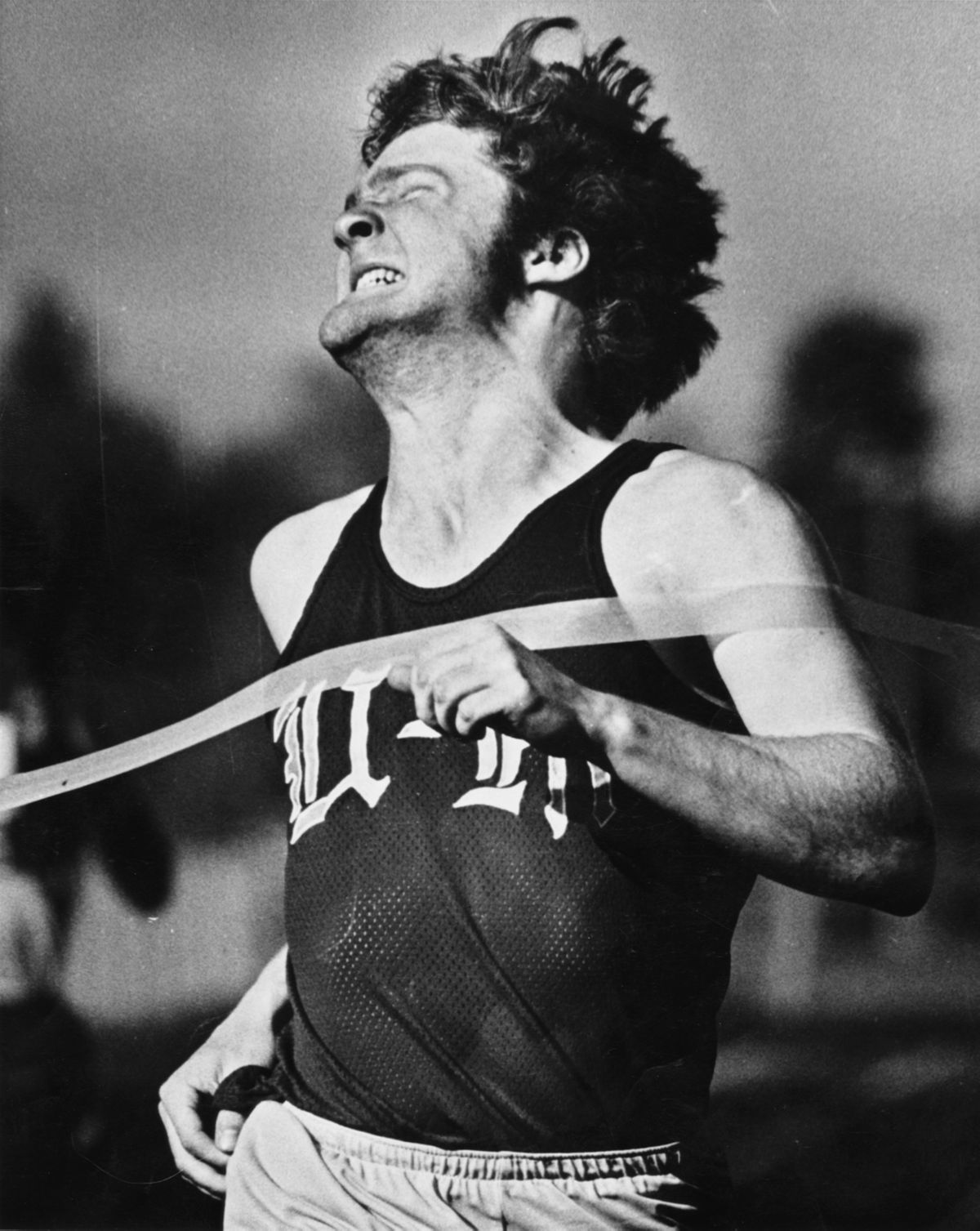Former U-Hi sprinter fulfills ‘Jeopardy!’ dream
Then & Now: Erik Krauss

Former University High and University of Portland sprinter Erik Krauss could easily be the question to an answer from his favorite television game show, “Jeopardy!”
“Quick reflexes came in handy for this man, whether it was anticipating a starter’s gun as a track and field sprinter or pushing a buzzer on this popular show.”
Krauss, 47, was the 1979 4A state 100 meter champion for the Titans and record setter in college, and nearly a winner on “Jeopardy!,” finishing second during an installment that aired in late May. His reasoning, Krauss said, got the better of his quick thumb and he bet too little on an answer he ultimately knew the question to.
“I was thrilled,” Krauss said of his appearance. “It’s something I always wanted to do and just to make it on the show, again, it’s the culmination of a dream.”
“Jeopardy!” was one more chapter in a varied and fascinating life that has allowed him to explore the world.
Today, Krauss lives with his wife, Debrah, and son, Spencer, in South Williamsport, Pa., home of the Little League World Series, and commutes to Drew University in New Jersey. He is the director of international and off-campus programs at the private college that began as a Methodist seminary, and oversees the placement of students for terms in London, Brussels or Africa.
“I kind of fell into it,” Krauss said. “I went from teaching to teaching abroad and now into these positions.”
He graduated in communications management from Portland, where he had a stellar track career.
He obtained his education degree at Eastern Washington and spent a year at Gonzaga Prep teaching and assisting in track.
Then it was off to the University of Washington, where he tutored and oversaw that program for athletes while working toward his master’s degree, which he subsequently obtained at Cornell.
He taught internationally for a variety of colleges in Italy, Japan – where he met his wife – and the Netherlands. While there he became assistant director for academic and student life for Boston’s Emerson College European center in 1996. He also was the assistant moat-keeper at Castle Well, an anecdote that came to light on “Jeopardy!” Host Alex Trebeck told him they’d never before had a moat keeper on the show.
“It’s an old Dutch castle. I was responsible for the moat levels when the keeper was on vacation,” Krauss said in a telephone interview. “If they were low I pumped water from one into the other to keep them supported.”
In Florence, with New York University in 2001-03, he said he was housed in a 500-year-old villa with a working olive orchard.
In his current job, Krauss commutes 170 miles, spending five days at Drew and weekends in Pennsylvania with his wife of eight years and 6-year-old son, “until my wife finds a job here or I find one there.”
Spencer was diagnosed four years ago with a form of autism characterized, Krauss said, by difficulty interacting with his peers.
“Luckily we discovered what was going on at an early age,” he said. “He just completed a year at a private kindergarten and has shown incredible progress this last year.”
His son also shows flashes of the speed that led to Krauss’ time in the limelight.
As a junior at U-Hi in 1979, the stocky speedster dashed 10.06 for the state title in Renton. And he ran 21.84 for 200 meters that still ranks among the top 65 times in state. He said he valued the track experience at U-Hi.
“Bill Ames and Mike Van Matre were exceptional coaches who had a tremendously positive impact on my life,” Krauss said.
During his senior year, Krauss tore his hamstring and was further hamstrung by the eruption of Mount St. Helens. He didn’t repeat his state success.
“Districts were canceled,” Krauss recalled. “The meet was originally scheduled in Yakima but they moved it to Highline. I couldn’t work out or train for a couple of weeks. It was a mess.”
At Portland, he was three-time MVP of the team and captain of the Pilots as a senior. He ran 100 meters in 10.4, second on the school’s all-time list, and is tied for the 200 record in 21.02. There were no regional meets in those days and he missed the NCAA qualifying standard by .07 of a second.
“I ran against Carl Lewis on a couple of occasions,” he said.
His obsession with “Jeopardy!,” Krauss said, began when he was little and Art Fleming was host. For two decades, beginning in 1985, he had tried to get on the show, but never was called.
In 2008 he took the test online, passed and received a congratulatory e-mail that said “you may or may not hear from us again.” After taking an in-person test in Manhattan, in January of this year Krauss was called to go to Culver City, Calif., on Feb. 24 for a taping.
“Just to make it there was special,” he said.
But he wasn’t ready for the vagaries of the signal button. Push it too soon before a light comes on following the question and you’re locked out. Push it too late and you’re out of luck.
“You really have to time it so you hit a button a millisecond before the light goes on,” he said.
Sort of like beating a starter’s gun without being detected for a false start?
“I think that’s probably a good analogy,” Krauss said.
After getting the hang of the button he rallied to lead with $16,800 to $16,600 entering Final Jeopardy. But he risked only $300, reasoning that he didn’t know much about English history. When he was shown the answer, however, he knew the question.
“I knew immediately I lost,” he said. “If (only) I had given a more traditional bet. … But I was worried.”
Still, he said, it was a once-in-a-lifetime opportunity.